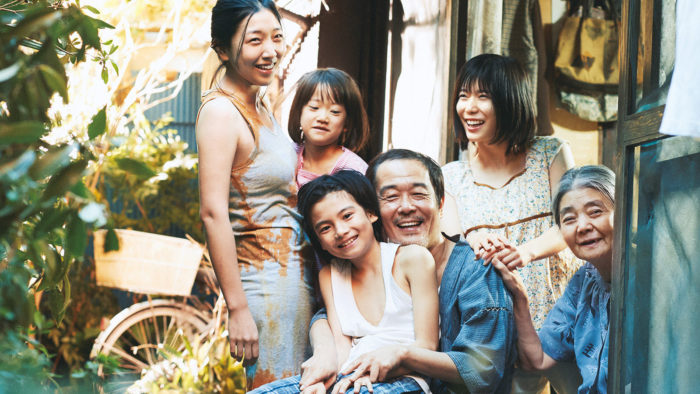
Japan at Cannes
Following on from the success of Kore-eda’s ‘Shoplifters’ at last years Cannes Film Festival, we might have hoped for further Japanese films in the 2019 edition, which started on the 14th May. Sadly there are no Japanese entries in any of the official selections. Miike Takashi’s UK-Japan co-production ‘First Love’ screens in the Director’s Fortnight, but there will not be a follow-up to ‘Shoplifters’ picking up the Palme d’Or.

My first visit to the festival was in 2002 and during the many trips there since I have made a point of dropping by the Japan Pavilion for at least one of their sake nights. Whether discussing the ups and downs of Japanese film, meeting directors and producers, or even, on one occasion, running into Zebraman, it was always a highlight of my time on the French coast.
I thought I’d take this opportunity to take a look at Japan’s successes at Cannes over the years.
1. GATE OF HELL (Palme d’Or, 1954).
In 1955 Kinugasa Teinosuke’s ‘Gate of Hell’ became the second Japanese film, after Kurosawa’s ‘Rashomon’, to be awarded a special Oscar as ‘Best International Film’, but the previous year Cannes had already honoured the film competitively with the Palme d’Or, up against a large slate of films including Oscar winner ‘From Here to Eternity’.
With the West being introduced to Japanese film by Kurosawa’s monochrome masterpieces, ‘Gate of Hell’ is an astonishing wave of colour across the screen. In a rare event for a foreign language picture, it also won a competitive Oscar for costume design, and it was well deserved. Fabrics of every colour and pattern cover the cast of thousands and the screen positively glows. Its story and action may now be more familiar to western audiences, but its beauty has rarely been equalled.
1.5 EMPIRE OF PASSION (Prix de la mise en scene, 1978)
The Palme d’Or isn’t the only award given at Cannes. A ‘Best Director’ award (the Prix de la mise en scene) is also given, and rarely to the winner of the Palme. The only Japanese winner of this award was Oshima Nagisa in 1978 for his ‘Empire of Passion’, a sequel of sorts to his better known and controversial ‘In the Realm of the Senses’.
Given ‘In the Realm of the Senses’ history of banning and cuts, Cannes’ award to Oshima for the more restrained follow-up can maybe be seen as a belated recognition of the former film.
2. KAGEMUSHA (Palme d’Or, 1980)
Despite Oshima’s success Japan had to wait 26 years for its second Palme d’Or. Avoiding the controversies of new blood it came at the hands of the old master, Kurosawa. The award was shared with Bob Fosse’s ‘All That Jazz’, a quite common occurrence at that time, though rare in recent years.
Loosely based on Takeda Shingen, whose mysterious death in 1573 has allowed for much speculation in Japanese film over the years, this was only Kurosawa’s second film in a decade, and his first in Japan since 1970. Even then it was only completed when George Lucas and Francis Ford Coppola persuaded 20th Century Fox to make up the shortfall in the budget which Toho could not supply.
3. THE BALLAD OF NARAYAMA (Palme d’Or, 1983)
Japan didn’t have so long to wait until it’s next Palme d’Or. Imamura Shohei’s film was a second telling of Fukazawa Shichiro’s book. It moved away from the deliberate theatricality of Kinoshita Keisuke’s 1958 telling and placed the story in a more real environment. It also ramped up the violence and sexuality which the original had merely hinted at.
In an impoverished rural village, when any villager reaches the age of 70 they must walk to the top of a mountain to die, relieving the village of a need to provide for them. Imamura intertwined images of nature with the brutal village life as the protagonist, Orin, prepares herself and her family for her journey to the mountain.
4. THE EEL (Palme d’Or 1997)
Imamura became the first Japanese director to take home the Palme d’Or twice when fourteen years later he won for ‘The Eel’ (once again shared, this time with Kiarostami’s ‘Taste of Cherry’). The film is also notable for being the first non-period film from Japan to win at Cannes. Japanese critics noted at the time that it was gratifying to see a Japanese film recognised abroad when they were receiving little notice at home. Has this situation changed in the last twenty years?
‘The Eel’ tells the story of Yamashita Takuro, played by Yakusho Koji, who is released from prison and tries to move on with his life, accompanied only by his pet eel. After saving a girl from suicide, and being recognised by an old prison colleague, he finds himself unable to escape involvement in spiralling events.
(no English subs)
5. SHOPLIFTERS (Palme d’Or 2018)
Nominated for an Oscar, a Golden Globe and a Bafta, it was Cannes that rewarded Kore-eda Hirokazu’s film with it’s top honour, after it had swept the boards at the Japanese Academy, with eight wins and a further five nominations. ‘Shoplifters’ maintained Kore-eda’s run of films that have created unusual family groups and found strangely uplifting sentiments in what would otherwise be difficult circumstances.
An unusual family of petty thieves take in a child they find in the street, and the actual origins of the family and its members are slowly revealed, as are their warmth and happiness, when compared with the background of the family’s newest member.
With ‘The Eel’ and ‘Shoplifters’ moving international recognition away from exotic period drama’s and into the contemporary world, hopefully we won’t be waiting another 20 years for Japan to carry the Palme d’Or home again.
